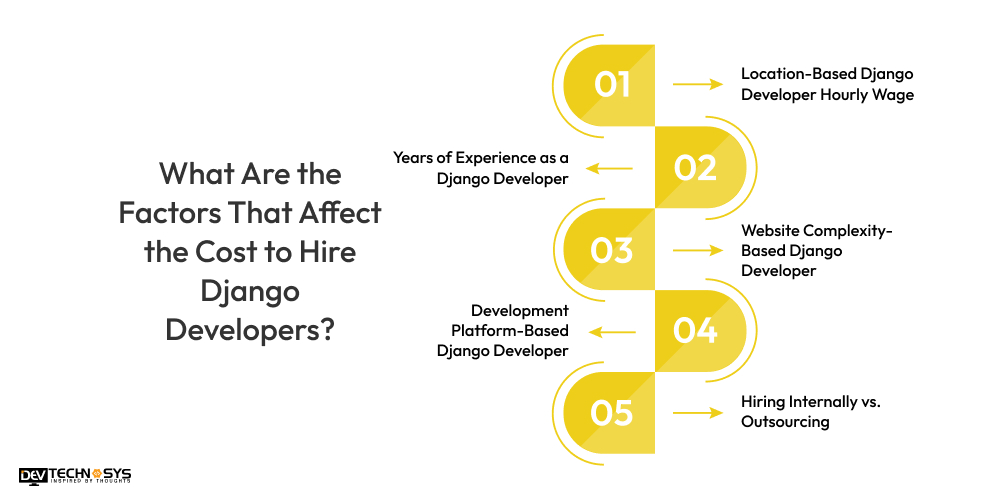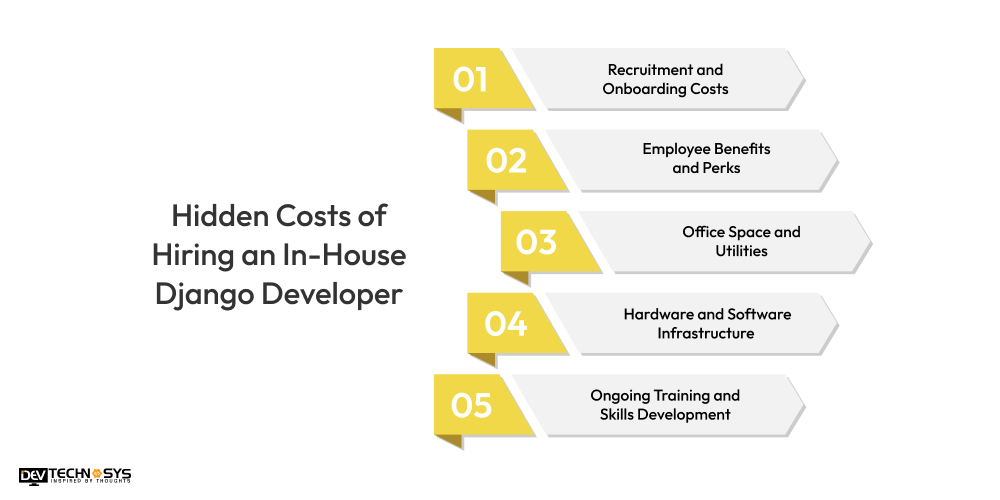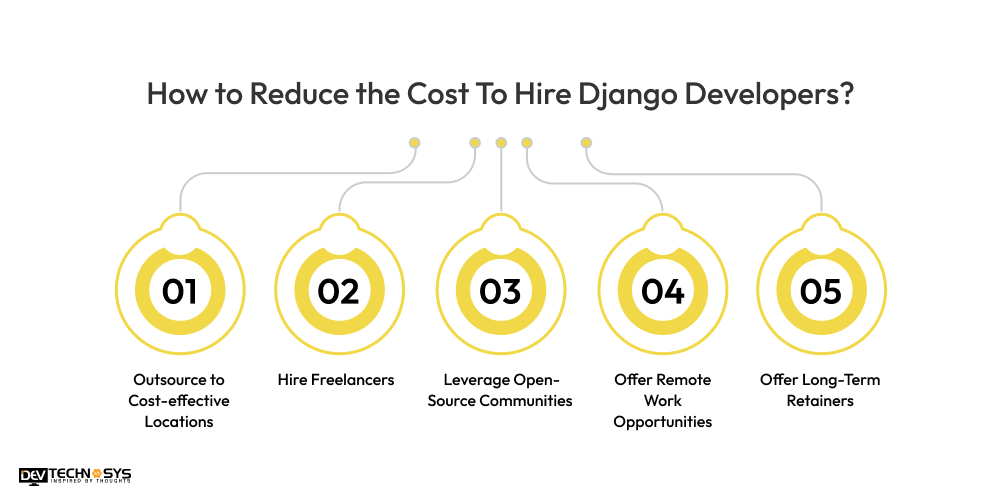Key Takeaways:
- The cost of hiring Django developers in 2025 is likely to be between $10 and $50+ per hour, raising the question of whether this aligns with your project’s budget.
- Entry-Level Django Developer: Junior-level developers with basic development knowledge typically cost between $10 and $20 per hour. Does this skill level meet your project’s requirements?
- Mid-Level Django Developer: Hiring mid-level developers with moderate app development expertise typically costs between $20 and $35 per hour. Does this align with your app development needs?
- Senior-Level Developer: Senior-level developers with expertise in complex app development typically charge between $35 and $50 per hour. While their skills may be ideal for your project, can your budget accommodate this cost?
From e-commerce platforms to social media platforms, all are developed by Django Python web framework. Do you want to hire Django developers to develop your project rapidly? If you agree with this statement. Then you visit the right place.
Most individuals and businesses are stuck in that what is the cost of hiring Django developers. And what factors can highly affect the hiring cost?
No need to go anywhere, we provide all the questions and answers in one platform.
Many crucial factors must be considered when hiring Django developers and developers on a fixed budget.
Let’s explore the cost to hire Django developers in 2025, the hiring cost in different regions, factors that affect the hiring cost, and how to reduce the cost.
What is the Cost to Hire Django Developers?
The cost of dedicated developers for hire based on experience and location. Junior developers typically charge $10–$20 per hour, mid-level developers range from $20–$35 per hour, while senior developers with advanced skills typically cost $35–$50+ per hour. Rates depend on project complexity and developer expertise.
| Region | Entry Level Django Developer(0 to 2 Years) | Mid-Level Django Developer(2 to 4 Years) | Senior Level Django Developer(5+ Years)
|
| United Kingdom | $12 to $21 Per Hour | $22 to $36 Per Hour | $37 to $50 Per Hour |
| Western Europe | $10 to $15 Per Hour | $18 to $32 Per Hour | $33 to $46 Per Hour |
| Eastern Europe | $10 to $16 Per Hour | $17 to $33 Per Hour | $34 to $47 Per Hour |
| UAE | $12 to $22 Per Hour | $22 to $34 Per Hour | $34 to $49 Per Hour |
| USA | $10 to $20 Per Hour | $20 to $35 Per Hour | $35 to $50 Per Hour |
| Australia | $12 to $18 Per Hour | $21 to $34 Per Hour | $35 to $48 Per Hour |
| Southeast Asia | $10 to $18 Per Hour | $18 to $32 Per Hour | $33 to $45 Per Hour |
Skills Required for Entry-Level Django Developers:
- Strong understanding of Python syntax and object-oriented principles.
- Knowledge of web page structure and design using HTML/CSS.
- Familiarity with Django’s MVC architecture and core components.
- Experience with SQL databases like PostgreSQL, MySQL, or SQLite.
Skills Required for Mid-Level Django Developers:
- Deep understanding of Python, including decorators, generators, and concurrency.
- Proficient in building and consuming APIs with DRF.
- Ability to design complex queries and optimize database performance.
- Strong skills in writing unit tests and debugging code effectively.
Skills Required for Senior-Level Django Developers:
- Expertise in designing large-scale, distributed, and fault-tolerant systems.
- Mastery of Django’s internals, middleware, signals, and custom management commands.
- Proficient in deploying and managing apps on AWS, GCP, or Azure.
- Skilled in optimizing complex databases and handling migrations at scale.
What Are the Factors That Affect the Cost to Hire Django Developers?
The cost of Django and web developers for hire is influenced by several key factors, including the developer’s location, experience, and expertise. Additionally, the complexity of the app being developed, the chosen development platform, and whether the hiring is done in-house or through outsourcing can all impact the overall development costs.

1. Location-Based Django Developer Hourly Wage
The geographic location of Django developers has a big impact on their hourly rate. Because of the higher cost of living and increased demand for their products, developers from high-cost locations such as Western Europe and North America charge higher fees. On the other hand, developers from Southeast Asia, India, or Eastern Europe usually have lower prices.
| Countries | Developers Cost/ Per Hour |
| USA | $10 to $50 |
| United Kingdom | $12 to $50 |
| UAE | $12 to $49 |
| Australia | $12 to $48 |
| India | $10 to $45 |
| Spain | $13 to $47 |
| Ukraine | $10 to $46 |
| Philippines | $11 to $49 |
| Canada | $10 to $48 |
2. Years of Experience as a Django Developer
The hourly fee of a developer is directly influenced by their level of experience. Mid-level developers (3-5 years) demand a higher pay for their honed skills, while junior developers (0-2 years) charge less because they have less experience. Because they contribute advanced technical knowledge, leadership skills, and problem-solving expertise to projects, senior developers (5+ years) charge the highest rates.
| Experience | Years of Experience | Developers Hourly Cost |
| Entry Level | 0-2 Years | $10 to $20 |
| Mid-Senior Level | 2-4 Years | $20 to $35 |
| Senior Level | 5+ Years | $50+ |
3. Website Complexity-Based Django Developer
The cost of Django developers for hire is significantly influenced by the project’s complexity. Simple apps, such as blogs or simple websites, can be developed more quickly and at a lower cost. However, complicated websites—such as social networks, e-commerce platforms, or real-time systems—need more specialized knowledge, longer development cycles, and advanced functionality, which raises website development costs.
| Website Complexity | App Type | Junior Developer | Mid-level Developer | Senior Developer |
| Basic Website | Event Website,
Music Website, Blog Website |
$10 – $20 Per Hour | $20 – $30 Per Hour | $35 – $50 Per Hour |
| Mid-Premium Website | Social Media Website,
Real Estate Website, Online Learning Platform |
$12 – $22 Per Hour | $25 – $32 Per Hour | $36 – $40 Per Hour |
| Premium Website | LMS Website,
Custom News Website, Custom Job Board Website |
$15 – $25 Per Hour | $26 – $35 Per Hour | $40 – $50 Per Hour |
4. Development Platform-Based Django Developer
The total cost is influenced by the platform on which the Django application is being created. While cloud-based solutions (AWS, GCP) and mobile applications (iOS/Android) frequently need for extra tools, services, and knowledge, developing web applications is typically less expensive. Because they require more development, integration, and maintenance work, more complicated platforms demand higher prices.
| Development Platform | Entry Level | Mid-Senior Level | Senior Level |
| iOS App Platform | $15 – $22 | $25 – $35 | $40 – $50 |
| Android App Platform | $12 – $20 | $22 – $32 | $38 – $47 |
| Cross-platform App Development | $10 – $18 | $20 – $30 | $35 – $45 |
5. Hiring Internally vs. Outsourcing
Since in-house employment entails extra expenses for recruitment, office space, salary, and benefits, it is typically more costly. Because foreign markets have lower hourly rates, outsourcing—whether through web development company or independent contractors—can drastically cut costs. Outsourcing, however, might present difficulties such time zone variations, communication problems, and quality control.
| Hiring Method | Developer’s Cost/ Per Hour |
| In-House | $15 – $50 |
| Outsourcing(Freelance) | $10 – $40 |
| Outsourcing(Agency) | $15 – $48 |
Where to Find Talented Django Developers at Competitive Rates?
You can find mobile app developers for hire at competitive rates through freelance platforms like Upwork, Fiverr, and Toptal or by exploring outsourcing agencies in regions with lower living costs, such as Eastern Europe, India, and Southeast Asia. Additionally, niche job boards and tech meetups are great for sourcing developers.
| Platform | Examples | Why Choose This Platform? | Best Suited For |
| Developer Networks | GitHub, Stack Overflow, HackerRank | ● Connect with highly skilled developers
● Review their open-source contributions and expertise. |
● Niche skills
● Open-source ● Collaborations ● Specialized Django tasks. |
| Development Agencies
|
Dev Technosys | ● Offers end-to-end solutions (Design, Development, Maintenance).
● Dedicated teams ensure on-time delivery and seamless management. |
● Large-scale projects
● Complex tasks ● All-in-one project handling |
| Social Platforms | X (formerly Twitter), LinkedIn | ● Reach passive candidates.
● Network with industry professionals ● Review profiles, portfolios, and feedback |
● Networking for talent
● Hiring for simpler or medium-scale Django apps. |
| Job Portals
|
LinkedIn, Indeed, Glassdoor | ● Access a wide range of candidates with tailored skillsets
● Advanced filtering options for precise targeting |
● Full-time hiring
● Long-term Django development ● Team building |
| Freelance Marketplaces | Freelancer, Fiverr, Upwork | ● Access to a global talent pool
● Flexibility in hiring ● Review past projects and developer feedback. |
● Short-term Django projects
● Budget-conscious ● Temporary Needs |
Hidden Costs of Hiring an In-House Django Developer
When recruiting an in-house Django developer, firms frequently focus on salaries but ignore several hidden expenditures that can pile up quickly. Here are five hidden costs that you should consider:

1. Recruitment and Onboarding Costs
Hiring an in-house developer incurs recruitment costs, which include job advertisements, recruitment agency fees, and time spent interviewing candidates. Furthermore, onboarding costs like as training, setting up workstations, and familiarizing new staff with corporate tools and culture might result in a considerable upfront outlay.
Estimated cost: $2,000 to $5,000 or more.
2. Employee Benefits and Perks
In addition to a developer’s base compensation, web development companies must offer benefits such as health insurance, retirement plans, paid time off, and other perks such as office snacks, gym memberships, or commute subsidies. These benefits can significantly boost the overall compensation package, frequently by 20-30% of the wage.
Estimated cost: 20-30% of annual salary
3. Office Space and Utilities
If the organization operates from a physical location, the costs of supplying office space, utilities (electricity, internet), and maintenance for the developer’s workspace can be substantial. For businesses with numerous developers, these costs can add up.
Estimated cost: $5,000 to $15,000 per year per developer.
4. Hardware and Software Infrastructure
To be productive, an in-house developer must have the necessary hardware (computers, servers) and software (tool, IDE, and collaboration platform licenses). This includes both the initial expenditures of setting up the developer’s workspace and continuing expenses for application maintenance and support.
Estimated annual cost: $1,000 to $3,000 per employee.
5. Ongoing Training and Skills Development
To stay up with emerging technology, in-house developers must receive ongoing training and skill development. Whether it’s attending conferences, taking online courses, or acquiring new learning materials, these expenses are frequently disregarded but are required to maintain developer productivity and performance.
Estimated cost: $1,000 to $3,000 per year
How to Reduce the Cost To Hire Django Developers?
Hiring Django developers can be a substantial investment, but there are various ways to minimize the overall cost without sacrificing quality. Here are five techniques to reduce the cost to hire Django experts.

1. Outsource to Cost-effective Locations
One of the most successful strategies to save recruiting costs is to outsource development to nations with cheaper labor prices while still having access to highly educated workers. Countries like as India, Eastern Europe (e.g., Ukraine, Poland), and Southeast Asia (e.g., Vietnam, Philippines) supply Django developers at a lower cost than the United States or Western Europe.
Hiring developers in these countries allows businesses to access high-quality code while saving greatly on pay, benefits, and overhead expenditures.
Savings: 30%-50% on local hiring full-stack Django developer cost.
2. Hire Freelancers
Instead of committing to full-time in-house developers, consider Django freelance developer cost for certain projects or short-term requirements. This enables businesses to avoid the long-term expenses of employee benefits, office space, and full-time salary. Freelancers can be hired for specific tasks such as developing a feature or meeting a milestone, and you just pay for the work done.
This approach is suitable for firms who require Django tutorial for a limited time, as it helps to save expenses while preserving flexibility.
Savings: Potentially 20%-40% over hiring full-time developers.
3. Leverage Open-Source Communities
Django has a robust open-source community. Participating in open-source collaborations allows you to meet outstanding engineers who are adding code to repositories, demonstrating their talents, and looking for opportunities.
This strategy may help you identify developers who are enthusiastic about Django and willing to work at lower rates because they are involved in open-source initiatives.
Creating partnerships or collaborations within these communities can help to minimize recruitment costs and streamline the employment process.
Savings: Recruitment fees and overhead costs.
4. Offer Remote Work Opportunities
Offering remote work choices is an effective approach to attract talent from lower-cost countries without incurring relocation charges or paying for expensive office space. According to the full stack development company USA, remote work also provides access to developers with particular Django abilities, independent of their geographic location.
Furthermore, because there is no need for commuting or relocation, remote developers frequently have flexible working hours and can offer low rates.
Savings: Office-related costs, recruitment overhead, and commuting expenses.
5. Offer Long-Term Retainers
Instead of hiring developers on a project-by-project basis, consider forming long-term alliances or retainers. This provides developers with constant and predictable work, while also allowing firms to negotiate better pricing. In exchange, you get devoted talent who knows your systems, which reduces the need for costly ramp-up times.
Establishing a long-term partnership can help lower recruiting costs by eliminating the need to locate new developers for each project.
Savings: 10%-20% on per-project costs; reduced recruitment effort.
Conclusion
In 2025, the cost to hire Django developers will continue to be influenced by factors like location, experience, project complexity, and hiring model. While in-house teams may incur higher overhead costs, outsourcing, freelancing, and remote hiring offer more affordable alternatives.
By strategically leveraging open-source tools, hiring junior developers, and considering offshore talent, businesses can efficiently manage costs while securing skilled Django developers for their projects, ensuring high-quality outcomes without breaking the bank. Do you want to hire remote Django developers? You can reach out to a Django development company in USA to hire at an affordable cost.
Frequently Asked Questions
1. What is the Average Cost to Hire Django Developers in 2025?
In 2025, the average Django developer cost 2025 ranges from $10 to $50 per hour, depending on location, experience, and project complexity, with higher rates for senior developers.
2. How Much Does it Cost to Hire Django Developers for a Full-Time Position?
Full-time Django developers can expect salaries between $20,000 and $22,000 annually in the U.S., with lower salaries in countries like India (around $6,000 – $10,000 annually).
3. What Factors Influence the Cost of Hiring a Django Developer?
The cost of hiring a Django developer is determined by several factors, including experience level (junior, mid, senior), project complexity, location (offshore vs. onshore), industry demand, and whether you’re recruiting freelancers, agencies, or full-time staff.
4. Are There Hidden Costs When Hiring Django Developers?
Yes, hidden costs when hiring Django developers can include recruitment fees, onboarding expenses, training, project management, overtime for urgent deadlines, and potential communication barriers when working with remote or offshore developers.
5. What Are the Key Differences Between Node.js vs Django?
Node.js is a JavaScript runtime environment used for building server-side applications, while Django is a Python-based web framework. Node.js offers non-blocking I/O for real-time apps, while Django focuses on rapid development with built-in features.
6. What Are the Main Differences Between Laravel vs Django?
Laravel is a PHP-based web framework focused on elegant syntax and ease of use, while Django is a Python framework emphasizing rapid development and scalability with built-in features like authentication and ORM.
























